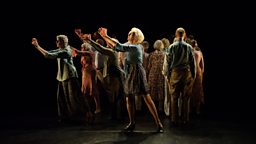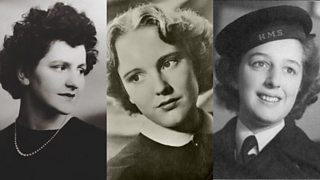Why do dancers die twice?
With bodies honed to perfection, dancers' careers can be unexpectedly brief. As the Radio 4 documentary A Dancer Dies Twice finds out about their final dances, we ask why and whether their professional lives should be so brief.

“It can be really daunting, like reaching an abyss,” says former professional dancer and choreographer Isabel Mortimer. “The dancer can be thinking to themselves, ‘I have no idea who I am, or what I am and I’ve left my family’ - if you’ve left a company you’ve typically left a whole family that’s carrying on.”
A dancer’s career transition can be incredibly lonely."Isabel Mortimer, Dancers’ Career Development
On average, a dancer’s performance career tends to end around the age of 35. They’ve often been shaping muscle and bone into elegant lines since shortly after they first learned to walk, moulding their bodies to achieve the perfect balance of powerful athleticism and artistic grace.
After a performance career filled with adrenaline - rapid heartbeats and post-pirouette gasps for air - the physical effects of stopping dancing can be equally intense. “You’re used to a rhythm of building up to a show, doing shows and then having a period of downtime and then building up again and I found that shockingly difficult not to have,” Isabel remarks. “It felt like flatlining.”
She has since used her experience to embark on a new career supporting dancers in the process of transition after their performance careers end. Isabel works as the director of coaching at Dancers’ Career Development. Founded in 1973, it was the first organisation in the world designed to help support dancers in this process, and still remains one of a relatively small number of spaces offering this support to post-performance career dancers.
“Typically, a dancer’s career transition can be incredibly lonely, isolating, often because you might be leaving a world where everyone’s continuing,” Isabel explains. “It can feel - because that’s all you’ve done - that you don’t know who you are outside of a dance studio, you don’t know what you’re good at, you don’t know what you’re interested in… it can be a very frightening place.”
The difficulty of dealing with this may be amplified by a vast expectation gap in the art form around retirement age. A recent study in dancers’ career transitions from the US-based aDvANCE Project found that many active dancers believe they will dance for almost 10 years longer than is likely. It found that currently active dancers expect to continue their performing careers until well into their 40s. However, dancers whose active careers are now actually stopped dancing professionally in their early to mid-30s.

Natasha Oughtred, a former principal ballerina with the Birmingham Royal Ballet, was 31 when she stopped dancing. “I posted a letter through the letterbox on Putney High Street. This was the critical moment in my career where I resigned, I stood with this letter in my hand and all these people walking past me, obviously having no idea what this one moment in my life meant, and I dropped the letter in the letterbox and I thought, ‘Well that’s it. It’s done’.”
We all know that after 21 your body’s going downhill and yet your artistry is growing and your knowledge as a person is growing."Jane Hackett, Sadler’s Wells
“I’d prepared myself mentally but the actual reality of having suddenly done it… I think it took me a good six months to come to terms with it, you know, to a degree and then to navigate out of it. No one tells you at the beginning.”
“There will be moments where it catches you unawares”, notes Natasha. “My little girl, who’s 15 months now, she managed to get onto my phone, and put on [Prokofiev's] Romeo and Juliet balcony pas de deux music, which I think probably is a piece of music that in the last few years I wouldn’t choose to listen to just because it brings back so many emotions of having performed the role. It was suddenly playing and it became apparent to me the amount of memories I had. I knew all these counts and all the steps and all the memories of different performances and partners. I felt like my mind was going on overdrive. I thought, ‘Gosh… I miss that!’”
“Many, many dancers talk about that,” says Isabel, “about not being able to listen to pieces of music and when they do listen to that music the multitude of emotions and thoughts that it brings back - back to the smell of the greasepaint, the costumes they were wearing, how that felt, what they felt like physically when they were doing it - even if they haven’t danced it for many years. Muscle memory is very, very powerful.”
Dancers retirement comes for a multitude of reasons: physical injuries, a slowing down of the body, the decision to have children or just a desire to try something new in their 20s or 30s after the intense dedication given since early childhood.
For those who want to continue, perhaps the changing body shouldn’t be a barrier to a far longer performance career. “Traditionally I think there was a view held that dancers past a certain age could no longer achieve the physical perfection, or near perfection, of the classical shapes of the ballet vocabulary and should therefore stop dancing while the public remembered them at their prime rather than seeing the physical body degenerate”, suggests Jane Hackett the former director of the English National Ballet School and now artistic programmer and producer for creative learning at Sadler’s Wells. “We all know that after 21 your body’s going downhill and yet your artistry is growing and your knowledge as a person is growing. I would question that thought that you have to stop because I think artists have a lot of other things to offer.”
Sadler’s Wells has had its own resident company of older performers since 1989 - Company of Elders - who are in their 60s, 70s and 80s, as well as a festival for works by mature dancers, the Elixir Festival, which has been running for the past few years. “I’m so pleased that we’re challenging these myths about age,” says Jane. “I can remember a time, some years ago now I’m glad to say, one of our national companies had a new director come in and take over and the first thing that he did was to retire every principal and soloist dancer who was over the age of 35 and a couple below that. It was a shocking loss of talent, of people at the height of their career with much more still to give and it actually left the company, I think, weaker because of losing those older artists. Legally it wouldn’t be allowed to happen now, and I hope that aesthetically people would be too wise to do that, but it’s just an example of how myths about age can take us in the wrong direction.”
More from Seriously...
-
![]()
Seven Lyrics to Use in Conversation Today
These song lines have become common parlance.
-
![]()
Five Women Who Wrote Rock
These writers helped define rock journalism in the 1960s.
-
![]()
Is Mindfulness Meditation Dangerous?
Jolyon Jenkins investigates whether meditation can do you more harm than good.
-
![]()
Neil Innes on the Bonzo Dog Doo-Dah Band
The band member recalls the anarchistic joy of a truly unique group.
-
![]()
Fake It 'Til You Make It
Why have fakes and fantasists always fascinated us?
-
![]()
Mary Beard vs Hair Dye
The writer and academic has a consultation with a legendary hair colourist.
-
![]()
The Recovering Addicts Who Inspired Trainspotting
The team of recovering addicts who made their mark on cinematic history.
-
![]()
Mao's Little Red Book Goes West
David Aaronovitch on how an Eastern political tract became a Western icon.
-
![]()
David Bowie in his Own Words
David Bowie's interviews reveal his humour, passion and determination to succeed.
-
![]()
Dotun and Dean
Broadcaster Dotun Adebayo revisits his youthful obsession with James Dean.
-
![]()
Gavin Esler on The Good Goering
Did Nazi leader Hermann Goering have a brother who saved innocent lives from the Holocaust?
-
![]()
10 Women Who Changed Sci-Fi
A selection of great female authors who have radically altered the genre.
-
![]()
Pick-Your-Own Utopia
Dream away those mid-winter blues by pondering our selection of fantasy idylls.
-
![]()
Meet the Burlesque Legends
Mat Fraser meets the former striptease stars back on the stage in their 70s and 80s.
-
![]()
Piers Plowright's Picks
The legendary radio maker recommends seven great documentaries for Seriously...
-
![]()
Neil Gaiman's Orphee
A poetic retelling of the Orpheus myth, from the celebrated writer Neil Gaiman.
-
![]()
Meeting Music's Nostradamus
An aspiring singer-songwriter meets the man who predicted the demise of the music industry decades ago.
-
![]()
The Seriously Hard Quiz
What have you learned from our documentaries? Try our fiendishly difficult quiz...
-
![]()
The Draw of War: Walt Disney and World War Two
Kellie Redmond explores Disney's fascinating contribution to the war effort.
-
![]()
Harry Shearer on New Orleans
The Simpsons star, satirist and actor reflects on the flood that devastated his home town of New Orleans.
-
![]()
The Bletchley Girls: Cracking Women
Meet five codebreaking women who helped beat the Nazis and are still alive to tell their tales.
-
![]()
Why We’re Hung Up on the Hang
Seven reasons to love the modern melodic drum that creates a haunting tone.
-
![]()
Philip Hoare: CSI Whale
The award-winning writer on porpoise dissections, stranded whales and beached dolphins.























